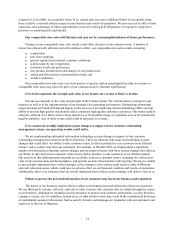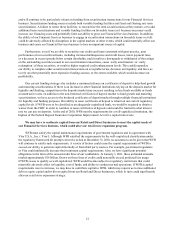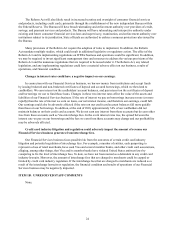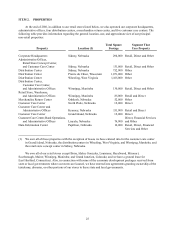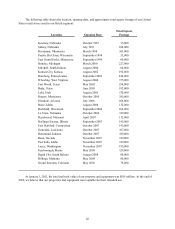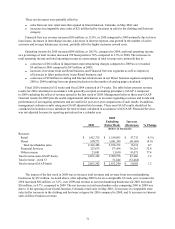Cabela's 2010 Annual Report Download - page 32
Download and view the complete annual report
Please find page 32 of the 2010 Cabela's annual report below. You can navigate through the pages in the report by either clicking on the pages listed below, or by using the keyword search tool below to find specific information within the annual report.22
It may be difficult to sustain the historical growth and profitability of our Financial Services business,
and we will be subject to various risks as we attempt to grow the business.
We may not be able to retain existing cardholders, grow account balances, or attract new cardholders and the
profits from our Financial Services business could decline, for a variety of reasons, many of which are beyond our
control, including:
• credit risk related to the loans we make to cardholders and the charge-off levels of our credit
card accounts;
• inability of cardholders to make payments to us due to economic conditions and limited access to other
credit sources;
• inability to manage credit risk and keep credit models up to date with current consumer credit trends;
• lack of growth of potential new customers generated by our Retail and Direct businesses;
• liquidity and funding risk relating to our ability to create the liquidity necessary to extend credit to our
cardholders and provide the capital necessary to meet the requirements of government regulators and
Visa;
• operational risk related to our ability to acquire the necessary operational and organizational
infrastructure, manage expenses as we expand, and recruit management and operations personnel with
the experience to run an increasingly complex and highly-regulated business; and
• the credit card industry is highly competitive with increased use of advertising, target marketing,
reward programs, and pricing competition in interest rates and cardholder fees as both traditional and
new credit card issuers seek to expand or to enter the market and compete for customers.
Economic downturns and social and other factors could cause our credit card charge-offs and
delinquencies to increase, or credit card balances to decrease, which would decrease our profitability.
Recent economic conditions have adversely affected unemployment rates, consumer spending, consumer
indebtedness, and the availability of consumer credit, which in turn adversely affected the ability and willingness
of the cardholders to pay amounts owed to our Financial Services business. These factors led to increased
delinquencies and charge-offs during the recent economic downturn. The general economic environment may
worsen, unemployment may continue to remain high, the housing market may continue to be depressed, and
consumer credit availability may decrease. The ability and willingness of cardholders to pay could be adversely
affected, which would increase delinquencies and charge-offs. In addition, if economic conditions deteriorate, the
number of transactions and average purchase amount of transactions on the credit card accounts may be reduced,
which would reduce the revenue of our Financial Services business. A variety of social and other factors also may
cause changes in credit card use, payment patterns, and the rate of defaults by cardholders. These social factors
include changes in consumer confidence levels, the public’s perception of the use of credit cards, changing attitudes
about incurring debt, and the stigma of personal bankruptcy. Our underwriting criteria, portfolio management,
product design, and collection operations may be insufficient to protect the growth and profitability of our
Financial Services business during a sustained period of economic downturn or recession or a material shift in
social attitudes.
The performance of our Financial Services business may be negatively affected by the performance of
our merchandising businesses.
Negative developments in our Retail and Direct businesses could affect our ability to grow or maintain our
Financial Services business. We believe our ability to maintain cardholders and attract new cardholders is highly
correlated with customer loyalty to our merchandising businesses and to the strength of the Cabela’s brand. In
addition, transactions on cardholder accounts produce loyalty points which the cardholder may apply to future
purchases from us. Adverse changes in the desirability of products we sell, negative trends in retail customer
service and satisfaction, or the termination or modification of the loyalty program could have a negative impact on
WFB’s ability to grow its account base.




